Transform Your Outdoor Space with Expert Landscape Gardening in Finchley
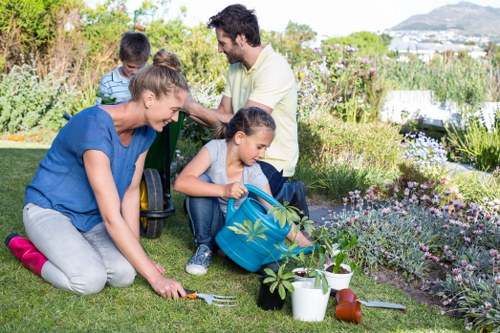
Welcome to the vibrant world of landscape gardening in Finchley, where your outdoor dreams take root and flourish. Finchley, known for its lush greenery and picturesque homes, offers the perfect canvas for creating stunning landscapes that enhance both beauty and functionality.
Whether you’re looking to redesign your garden, maintain existing greenery, or create a sustainable outdoor space, professional landscape gardening services in Finchley can help turn your vision into reality. With a focus on quality, creativity, and sustainability, Finchley’s garden experts are equipped to handle projects of all sizes and styles.
In this comprehensive guide, we’ll explore the key aspects of landscape gardening in Finchley, from design principles and plant selection to maintenance tips and the latest trends. Let’s embark on a journey to create a garden that not only elevates your property’s aesthetic but also provides a tranquil retreat for you and your family.
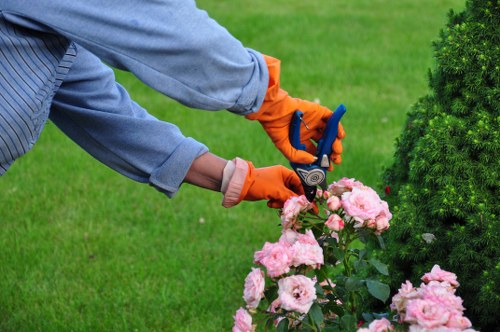
The Art of Landscape Design
At the heart of landscape gardening in Finchley lies the art of design. A well-designed garden harmoniously blends natural elements with architectural features, creating a balanced and inviting outdoor space.
Professional landscape designers in Finchley begin by assessing your space, understanding your preferences, and considering the local climate and soil conditions. This comprehensive approach ensures that your garden is not only beautiful but also sustainable and easy to maintain.
Key elements of landscape design include:
- Layout and Structure: Defining pathways, patios, and garden beds to create a functional flow.
- Plant Selection: Choosing plants that thrive in Finchley’s climate and complement each other in color, texture, and height.
- Hardscaping: Incorporating structures like fences, pergolas, and water features to add dimension and interest.
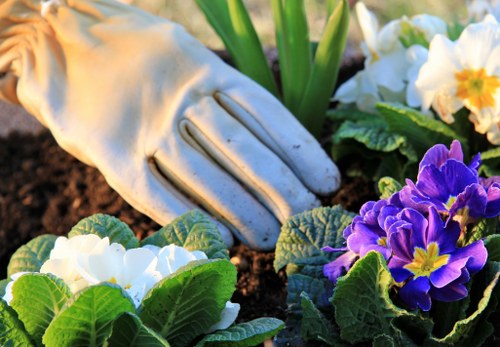
Plant Selection and Gardening Tips
Choosing the right plants is crucial for the success of your garden. In Finchley, a temperate climate allows for a diverse range of plants, from vibrant flowers to sturdy shrubs and elegant trees.
Consider the following when selecting plants:
- Climate Suitability: Opt for plants that are well-suited to Finchley’s weather patterns, ensuring they thrive year-round.
- Soil Health: Understanding your soil type helps in choosing plants that can grow robustly without excessive maintenance.
- Aesthetic Harmony: Select plants that create a cohesive look, balancing colors, textures, and heights for visual appeal.
Additionally, incorporating native plants can enhance biodiversity and reduce the need for watering and pesticides, contributing to a more sustainable garden.
Seasonal Planting
Embrace the changing seasons by planting a variety of flora that blooms at different times of the year. This ensures your garden remains lively and colorful throughout all seasons.
Spring:
- Tulips
- Daffodils
- Cherry Blossoms
Summer:
- Roses
- Lavender
- Sunflowers
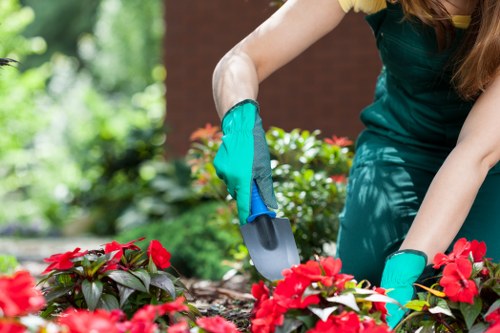
Hardscaping: Enhancing Your Garden’s Structure
Hardscaping plays a pivotal role in landscape gardening in Finchley, providing the structural foundation that supports the living elements of your garden.
Popular hardscaping features include:
- Patios and Decks: Perfect for outdoor entertaining and relaxation.
- Pathways: Guiding movement and adding visual interest.
- Water Features: Adding the soothing sound of running water.
Expert hardscaping not only enhances the beauty of your garden but also increases the functionality and value of your property.
Choosing the Right Materials
Selecting appropriate materials is essential for durability and aesthetics. Common materials used in Finchley include natural stone, brick, and composite materials, each offering unique benefits and styles.
Natural Stone:
Timeless and durable, natural stone provides a classic look that blends seamlessly with the natural environment.
Brick:
Versatile and robust, brick is ideal for creating pathways and patios with a traditional charm.
Composite Materials:
Modern and low-maintenance, composite materials are perfect for those seeking a contemporary aesthetic.
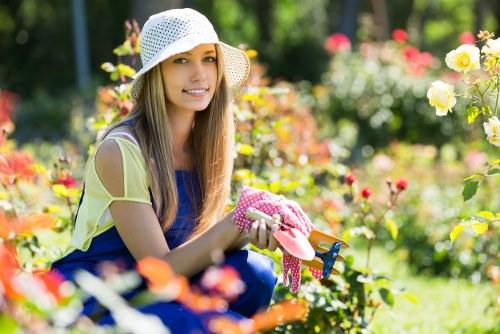
Sustainable Garden Practices
Embracing sustainability is a growing trend in landscape gardening in Finchley. Sustainable practices not only benefit the environment but also create a healthier and more resilient garden.
Key sustainable gardening practices include:
- Rainwater Harvesting: Collecting and utilizing rainwater reduces dependency on municipal water supplies.
- Composting: Recycling garden waste enriches the soil and reduces landfill contributions.
- Native Planting: Using native species conserves water and supports local wildlife.
Implementing these practices ensures your garden remains vibrant and eco-friendly for years to come.
Energy-Efficient Lighting
Incorporate energy-efficient lighting solutions to illuminate your garden while minimizing energy consumption. Solar-powered lights are an excellent option, providing sustainable illumination without the need for extensive wiring.
Low-Impact Maintenance
Design your garden to require minimal maintenance, saving time and resources. This can be achieved by selecting hardy plants, using mulch to retain moisture, and installing irrigation systems that optimize water usage.
Mulching:
- Reduces weed growth
- Conserves soil moisture
- Enhances soil fertility

Seasonal Maintenance Tips
Maintaining a beautiful garden requires regular care and attention. Seasonal maintenance ensures your garden remains healthy and vibrant throughout the year.
Here are some essential tips for each season:
- Spring: Prune dead branches, plant new flowers, and prepare soil for the growing season.
- Summer: Water plants consistently, manage pests, and harvest ripe produce if you have a vegetable garden.
- Autumn: Clear fallen leaves, plant bulbs for spring, and protect plants from early frosts.
- Winter: Prune trees, mulch garden beds, and plan for the next gardening season.
Pruning and Trimming
Regular pruning and trimming promote healthy growth and maintain the desired shape of your plants and trees. Proper techniques ensure plants remain strong and disease-free.
Watering Strategies
Efficient watering is crucial for plant health. Implementing drip irrigation systems and watering during the early morning reduces water waste and prevents fungal diseases.
Soil Testing:
- Determines nutrient levels
- Identifies pH balance
- Helps in selecting appropriate fertilizers

Incorporating Technology in Landscape Gardening
Modern technology enhances the efficiency and creativity of landscape gardening in Finchley. From smart irrigation systems to design software, technology plays a significant role in contemporary gardening practices.
Innovative tools and technologies include:
- Smart Irrigation Systems: Automated systems that adjust watering schedules based on weather conditions.
- Landscape Design Software: Allows for 3D visualization of garden designs, making planning more precise and interactive.
- Drones: Used for aerial surveys and monitoring large garden spaces.
Integrating technology into your garden management can lead to better results and a more enjoyable gardening experience.
Lighting Control Systems
Advanced lighting control systems enable you to customize the ambiance of your garden effortlessly. Remote-controlled lighting and programmable schedules enhance both security and aesthetics.
Automated Maintenance Tools
Robotic lawn mowers and automated fertilizing systems reduce the time spent on maintenance, allowing you to enjoy your garden without the hassle.
Benefits of Technology Integration:
- Increased efficiency
- Enhanced precision in gardening
- Improved sustainability

Choosing the Right Landscape Gardening Services in Finchley
Selecting a reputable landscape gardening service in Finchley is essential for achieving the best results. Consider the following factors when making your decision:
- Experience and Expertise: Look for companies with a proven track record and knowledgeable staff.
- Portfolio: Review past projects to assess the company’s style and quality of work.
- Customer Reviews: Feedback from previous clients provides insight into reliability and customer satisfaction.
- Comprehensive Services: Choose a service that offers a wide range of gardening solutions, from design to maintenance.
By carefully evaluating your options, you can find a landscape gardening service that aligns with your vision and requirements.
Customized Solutions
Every garden is unique, and a tailored approach ensures that your specific needs and preferences are met. Customized solutions consider factors such as space constraints, budget, and personal style.
Cost Considerations
Understand the pricing structure of different services. Transparent pricing and detailed quotes help you manage your budget effectively.
Budget-Friendly Tips:
- Prioritize essential elements
- Opt for native plants that require less maintenance
- Implement DIY projects for certain aspects

Latest Trends in Landscape Gardening
Stay ahead of the curve by incorporating the latest trends in landscape gardening in Finchley. These trends focus on sustainability, innovation, and enhanced outdoor living experiences.
Current trends include:
- Biophilic Design: Integrating natural elements to create a connection with nature.
- Vertical Gardens: Maximizing space with wall-mounted plant displays.
- Edible Landscapes: Combining beauty with functionality by growing herbs and vegetables alongside ornamental plants.
Embracing these trends can modernize your garden and make it a more inviting and productive space.
Outdoor Living Spaces
Creating dedicated areas for relaxation and entertainment enhances the usability of your garden. Features such as outdoor kitchens, seating areas, and fire pits provide comfortable spaces for gatherings.
Eco-Friendly Materials
Using sustainable materials in your garden design minimizes environmental impact and promotes a greener lifestyle. Recycled materials, natural stone, and responsibly sourced wood are excellent choices.
Smart Irrigation:
- Reduces water waste
- Optimizes plant health
- Integrates with smart home systems

DIY Landscape Gardening Tips
If you prefer a hands-on approach, here are some DIY tips for landscape gardening in Finchley:
- Plan Your Layout: Sketch your garden design, considering plant placement and hardscape elements.
- Choose the Right Plants: Select species that suit your climate and soil conditions.
- Install Proper Irrigation: Ensure your plants receive adequate water with an efficient irrigation system.
- Maintain Regularly: Keep your garden healthy with consistent pruning, weeding, and watering.
By following these tips, you can create and maintain a beautiful garden without professional assistance.
Starting Small
If you’re new to gardening, begin with a small area to build your confidence and skills. Gradually expand as you become more comfortable and experienced.
Tool Essentials
Invest in quality gardening tools to make your work easier and more efficient. Essential tools include:
- Pruning shears
- Garden gloves
- Spades and trowels
- Watering cans or hoses
Soil Preparation:
- Remove weeds and debris
- Amend soil with compost for better fertility
- Ensure proper drainage to prevent waterlogging

Enhancing Curb Appeal with Landscape Gardening
First impressions matter, and your garden plays a significant role in the curb appeal of your Finchley home. A well-maintained garden can increase property value and attract potential buyers.
Key strategies to enhance curb appeal include:
- Symmetrical Design: Create balance with symmetrical plant arrangements and pathways.
- Color Coordination: Use a harmonious color palette to make your garden visually appealing.
- Lighting: Illuminate key features to highlight your garden’s beauty during the evening hours.
Entryway Enhancements
Make a lasting impression with a beautifully designed entryway. Incorporate features like flowerbeds, shrubs, and decorative elements to create a welcoming atmosphere.
Seasonal Decorations
Update your garden’s appearance with seasonal decorations. From spring blooms to autumn foliage, seasonal changes can add dynamic visual interest.
Feature Plants:
- Boxwood for structure
- Hydrangeas for color
- Japanese maples for elegance

Creating a Wildlife-Friendly Garden
A wildlife-friendly garden not only supports local biodiversity but also adds a lively and dynamic aspect to your outdoor space. Incorporate elements that attract and sustain various forms of wildlife.
Ways to create a wildlife-friendly garden:
- Provide Habitat: Install birdhouses, bat boxes, and bee hotels to offer shelter and nesting sites.
- Plant Diversity: Use a variety of plants to support different species of insects, birds, and small mammals.
- Water Sources: Add water features like ponds or birdbaths to provide essential hydration for wildlife.
Pollinator Gardens
Pollinator gardens are essential for supporting bees, butterflies, and other pollinating insects. Plant flowers rich in nectar and pollen to attract these beneficial creatures.
Native Plant Selection
Choosing native plants ensures that your garden supports local wildlife and withstands regional pests and diseases effectively.
Benefits of a Wildlife-Friendly Garden:
- Increased biodiversity
- Natural pest control
- Enhanced garden beauty and interest

Maximizing Small Garden Spaces
Even with limited space, you can create a stunning landscape garden in Finchley. Utilize smart design techniques to make the most of your outdoor area.
Tips for maximizing small garden spaces:
- Vertical Gardening: Use wall-mounted planters and trellises to grow plants upward, saving ground space.
- Multi-Functional Furniture: Choose furniture that serves multiple purposes, such as storage benches or foldable tables.
- Mirrors and Lighting: Strategically placed mirrors and lighting can create the illusion of a larger space.
Compact Plant Varieties
Select plant varieties that remain compact and manageable, ensuring they fit well within the confines of a small garden without overwhelming the space.
Terracing
Implementing terraces can add depth and create distinct zones within a small garden, making the area appear larger and more organized.
Space-Saving Techniques:
- Use raised beds for better soil management
- Incorporate trellises for climbing plants
- Opt for dwarf or espalier trees

Integrating Edible Plants into Your Landscape
Blending edible plants with ornamental ones creates a functional and beautiful garden. An edible landscape not only provides fresh produce but also adds texture and color to your garden.
Ideas for integrating edible plants:
- Herb Gardens: Plant herbs along pathways or in containers for easy access and use.
- Fruit Trees: Incorporate fruit-bearing trees like apple, pear, or cherry into your garden design.
- Vegetable Beds: Designate specific areas for growing vegetables, ensuring they receive adequate sunlight and soil nutrients.
Kitchen Gardens
A kitchen garden allows you to grow fresh herbs and vegetables close to your kitchen, making meal preparation more convenient and enjoyable.
Companion Planting
Use companion planting techniques to enhance plant growth and deter pests naturally. Certain plants thrive when grown together, promoting a healthier garden ecosystem.
Popular Edible Plants:
- Basil
- Tomatoes
- Spinach

Conclusion: Elevate Your Finchley Garden Today
Embarking on a landscape gardening journey in Finchley opens up endless possibilities for creating a beautiful, functional, and sustainable outdoor space. Whether you’re a seasoned gardener or a beginner, the right design principles, plant selections, and maintenance practices can transform your garden into a personal sanctuary.
Don’t wait to bring your garden dreams to life. Contact us today to discuss your project and discover how our expert landscape gardening services in Finchley can help you achieve the perfect garden tailored to your needs.
Book your service now and take the first step towards a stunning outdoor space that you’ll enjoy for years to come!
